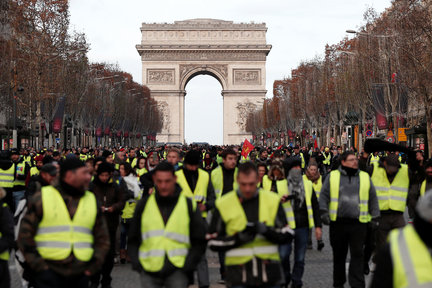Serge Halimi in Le Monde Diplomatique on yellow vests and the social order:
"There is no predicting the future of a movement so culturally alien to most people who read or write for Le Monde diplomatique. Its political prospects are uncertain and its eclectic character contributes to its appeal but threatens its cohesion and power. It is easier to make agreements between workers and the middle class over rejecting a fuel tax or abolishing the wealth tax than over changing the minimum wage, since small business owners and independent traders fear their costs will go up. Yet, there is a potential unifying bond, since many demands result from transformations of capitalism: inequality, wages, tax, the decline of public services, punitive environmental measures, offshoring, over-representation of middle-class graduates in public institutions and the media.
In 2010 journalist François Ruffin described two protest marches in Amiens on the same day, which crossed paths but did not join forces; one was workers from the Goodyear plant, the other, anti-globalisation campaigners demonstrating against anti-feminist legislation in Spain. Ruffin wrote: ‘It is as though two worlds, separated by just six kilometres, have turned their backs on each other. With no possibility of the “tough guys” from the factory joining what one worker called “the city-centre middle class out for a walk” ’ (7). Sociologist Rick Fantasia noted around the same in Detroit that there were ‘two lefts ... separate and distinct’, activists without political plans, and realists with no appetite for action (8). Even if the divisions in Amiens and Detroit are not identical, they show the growing gulf between a working-class universe constantly attacked yet trying to fight back, and a world of contestation inspired by intellectuals whose radicalism on paper is no threat to the social order. The yellow vests remind us of this division, but it’s not up to them alone to bridge it."
Read the article here.
Radicalism on paper is no threat to the social order, but is violence against the state a real threat to the social order? In theory yes, in reality? The BRD was not weakened by the Red Army Faction, rather strengthened. 9/11 may have been one of the midwives of new nationalism and xenophobia in the West, but just one of them. And it was not so much the attacks that weakened the state, it rather was the response to the attacks that turned out to be mistaken. (Read for example today's New York Times about the war in Afghanistan and the peace negations.)
Trump is a threat to the social order, but does that make him a revolutionary?
This is a beautiful sentence: "There is no predicting the future of a movement so culturally alien to most people who read or write for Le Monde diplomatique."
I suggest that Le Monde Diplomatique in an attempt to cross bridges gives all yellow vests a free subscription to Le Monde Diplomatique.
